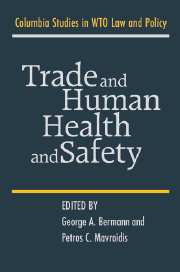Book contents
- Frontmatter
- Contents
- Preface to the Series
- Introductory Remarks
- 1 A Map of the World Trade Organization Law of Domestic Regulation of Goods
- 2 The WTO Impact on Internal Regulations: A Case Study of the Canada–EC Asbestos Dispute
- 3 Reflections on the Appellate Body Decision in the Hormones Case and the Meaning of the SPS Agreement
- 4 The Salmon Case: Evolution of Balancing Mechanisms for Non-Trade Values in WTO
- 5 Lotus Eaters: Reflections on the Varietals Dispute, the SPS Agreement and WTO Dispute Resolution
- 6 Regulatory Purpose and “Like Products” in Article III:4 of the GATT (with Additional Remarks on Article III:2)
- 7 The WTO Standard of Review in Health and Safety Disputes
- 8 Expert Advice in WTO Dispute Settlement
- 9 Domestic Regulation, Sovereignty and Scientific Evidence Requirements: A Pessimistic View
- 10 Time for a United Nations' “Global Compact” for Integrating Human Rights into the Law of Worldwide Organizations: Lessons from European Integration Law for Global Integration Law
- Index
7 - The WTO Standard of Review in Health and Safety Disputes
Published online by Cambridge University Press: 27 July 2009
- Frontmatter
- Contents
- Preface to the Series
- Introductory Remarks
- 1 A Map of the World Trade Organization Law of Domestic Regulation of Goods
- 2 The WTO Impact on Internal Regulations: A Case Study of the Canada–EC Asbestos Dispute
- 3 Reflections on the Appellate Body Decision in the Hormones Case and the Meaning of the SPS Agreement
- 4 The Salmon Case: Evolution of Balancing Mechanisms for Non-Trade Values in WTO
- 5 Lotus Eaters: Reflections on the Varietals Dispute, the SPS Agreement and WTO Dispute Resolution
- 6 Regulatory Purpose and “Like Products” in Article III:4 of the GATT (with Additional Remarks on Article III:2)
- 7 The WTO Standard of Review in Health and Safety Disputes
- 8 Expert Advice in WTO Dispute Settlement
- 9 Domestic Regulation, Sovereignty and Scientific Evidence Requirements: A Pessimistic View
- 10 Time for a United Nations' “Global Compact” for Integrating Human Rights into the Law of Worldwide Organizations: Lessons from European Integration Law for Global Integration Law
- Index
Summary
“Standard of review” is a term widely used in the law of the United States. It is most relevant when courts are reviewing decisions of administrative agencies. Various “standards” for review are set forth in scores of federal statutes. These include the “substantial evidence,” the “clearly erroneous,” and the “arbitrary and capricious” tests. The trade remedy statutes of the United States, dealing with the imposition of antidumping and countervailing duties, employ the substantial evidence test, i.e., whether there is substantial evidence of record to support an agency's determination. These tests may apply to questions of both law and fact, questions that are not always clearly separable, particularly in an administrative law context. As a general rule, however, an agency's construction of the law it is charged with administering is entitled to judicial deference under the doctrine announced in Chevron U.S.A. Inc. v. Natural Resources Defense Council, Inc.
US courts generally review agency decisions for conformity with the law applied by the agency. An exception is when they review the constitutionality of an agency decision, for example, for conformity to due process requirements. There would be no “Chevron deference” in such a case. Apart from the occasional constitutional review, however, courts and agencies are dealing with the same statute.
Dispute settlement panels of the World Trade Organization often review decisions of national agencies when another WTO Member challenges those decisions. However, this review is very different from the review of an administrative agency's decision by a municipal court.
- Type
- Chapter
- Information
- Trade and Human Health and Safety , pp. 224 - 234Publisher: Cambridge University PressPrint publication year: 2006



